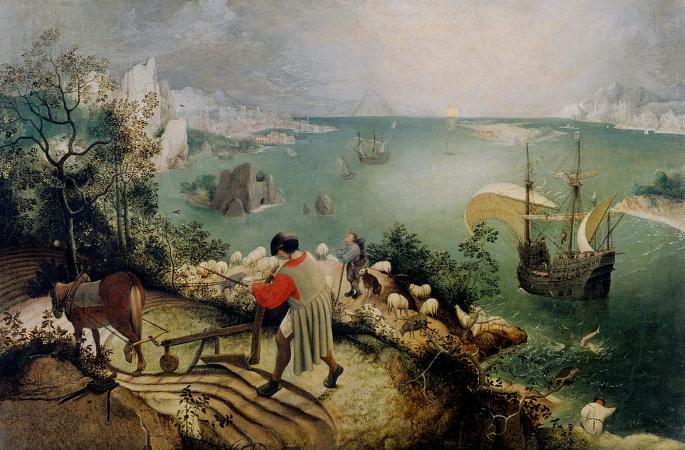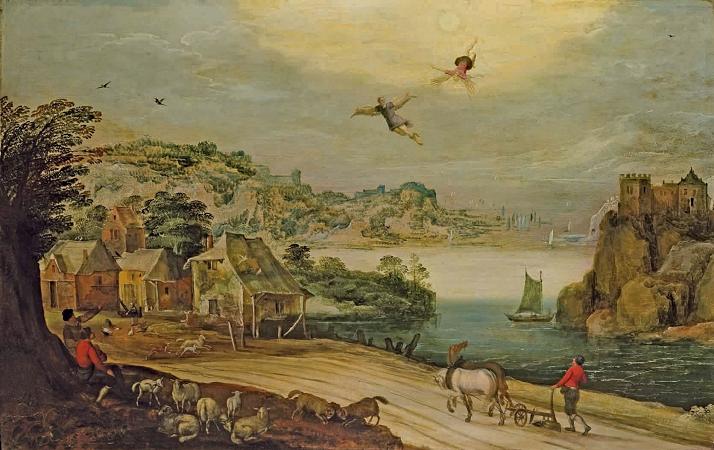Icarus. In Greek mythology, Icarus is the son of the master craftsman Daedalus, the creator of the Labyrinth. Icarus and his father attempt to escape from Crete by means of wings that his father constructed from feathers and wax. Icarus' father warns him first of complacency and then of hubris, asking that he fly neither too low nor too high, so the sea's dampness would not clog his wings nor the sun's heat melt them. Icarus ignored his father's instructions not to fly too close to the sun; when the wax in his wings melted he tumbled out of the sky and fell into the sea where he drowned, sparking the idiom don't fly too close to the sun. This tragic theme of failure at the hands of hubris contains similarities to that of PhaŽthon. Icarus's father Daedalus, a very talented and remarkable Athenian craftsman, built the Labyrinth for King Minos of Crete near his palace at Knossos to imprison the Minotaur, a half-man, half-bull monster born of his wife and the Cretan bull. Minos imprisoned Daedalus himself in the labyrinth because he gave Minos's daughter, Ariadne, a clew in order to help Theseus, the enemy of Minos, to survive the Labyrinth and defeat the Minotaur. Daedalus fashioned two pairs of wings out of wax and feathers for himself and his son. Daedalus tried his wings first, but before trying to escape the island, he warned his son not to fly too close to the sun, nor too close to the sea, but to follow his path of flight. Overcome by the giddiness that flying lent him, Icarus soared into the sky, but in the process he came too close to the sun, which due to the heat melted the wax. Icarus kept flapping his wings but soon realized that he had no feathers left and that he was only flapping his bare arms, and so Icarus fell into the sea and drowned in the area which today bears his name, the Icarian Sea near Icaria, an island southwest of Samos. Hellenistic writers give euhemerising variants in which the escape from Crete was actually by boat, provided by PasiphaŽ, for which Daedalus invented the first sails, to outstrip Minos' pursuing galleys, and that Icarus fell overboard en route to Sicily and drowned. Heracles erected a tomb for him. Icarus' flight was often alluded to by Greek poets in passing, but the story was told briefly in Pseudo-Apollodorus. In the literature of ancient Rome, the myth was of interest to Augustan writers. Hyginus narrates it in Fabula 40, beginning with the bovine love affair of PasiphaŽ, daughter of the Sun, resulting in the birth of the Minotaur. Ovid narrates the story of Icarus at some length in the Metamorphoses, and refers to it elsewhere. Ovid's treatment of the Icarus myth and its connection with that of PhaŽthon influenced the mythological tradition in English literature as received and interpreted by major writers including Chaucer, Marlowe, Shakespeare, Milton, and Joyce. In Renaissance iconography, the significance of Icarus depends on context: in the Orion Fountain at Messina, he is one of many figures associated with water; but he is also shown on the Bankruptcy Court of the Amsterdam Town Hall-where he symbolizes high-flying ambition.The 16th-century painting Landscape with the Fall of Icarus, traditionally but perhaps erroneously attributed to Pieter Bruegel the Elder, was the inspiration for two of the 20th century's most notable ecphrastic English-language poems, Musťe des Beaux Arts by W. H. Auden and Landscape with the Fall of Icarus by William Carlos Williams. Other English language poems referencing the Icarus myth are To a Friend Whose Work Has Come to Triumph by Anne Sexton, Icarus Again by Alan Devenish, Mrs Icarus by Carol Ann Duffy, Failing and Flying by Jack Gilbert, and Icarus Burning and Icarus Redux by Hiromi Yoshida. Literary interpretation has found in the myth the structure and consequence of personal over-ambition. An Icarus-related study of the Daedalus myth was published by the French hellenist FranÁoise Frontisi-Ducroux. In psychology there have been synthetic studies of the Icarus complex with respect to the alleged relationship between fascination for fire, enuresis, high ambition, and ascensionism.
more...












